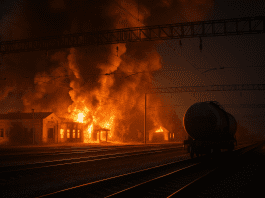Russia has officially ended its commitment to the Intermediate-Range Nuclear Forces (INF) Treaty, a Cold War-era agreement that banned certain types of nuclear weapons.
Russia Drops INF Treaty, Cites NATO Pressure
The announcement came shortly after U.S. President Donald Trump ordered two nuclear submarines to be moved closer to Russian borders.
In 1987, Soviet leader Mikhail Gorbachev and then-U.S. President Ronald Reagan signed the INF Treaty, which outlawed ground-based missiles with a range of 500–5,500 kilometers. At a time when world politics were tight, this deal assisted in lowering the quantity of hazardous nuclear weapons.
Russia, however, claims that it no longer feels obligated to the INF pact. The Russian Foreign Ministry blamed the “destabilizing missile build-up” by the U.S. and NATO as a major reason. They said the actions of the Western countries had created a “direct threat” to Russian national security. According to Russian state media RT, Moscow had been following a self-imposed restriction on these types of weapons even after the U.S. pulled out of the INF agreement in 2019.
In their official statement, the Foreign Ministry said:
“West’s build-up of destabilizing missile potentials creates a direct threat to the security of our country.”
🧨 Indo-Pacific boils — China, Russia open new front as India-Philippines flex military might
Trump’s Submarine Move Triggered Russian Exit
Days after Donald Trump acknowledged that he had directed two American nuclear submarines to be “positioned in the appropriate regions” close to Russia, Russia withdrew from the INF Treaty. Trump’s move was seen as a response to rising tensions and remarks made by Russian officials about the threat of a nuclear conflict.
Russian former president Dmitry Medvedev, who now serves as the Deputy Head of Russia’s Security Council, responded strongly. He said that NATO’s actions had forced Russia’s hand. The verbal spat between the two nuclear-armed states has escalated recently as Medvedev and Donald Trump have been trading abrasive remarks on social media.
Russian Stablecoin A7A5 Sees $1 Billion Daily Transfers, Total Tops $40 Billion
All of our adversaries will need to adjust to this new reality. Anticipate more actions,” Medvedev stated, without providing any particulars.
Medvedev also accused NATO nations of being responsible for the INF Treaty’s collapse. His comments show that Moscow believes that NATO’s military moves, especially missile deployments near Russian borders, have gone too far. He called NATO’s influence “a clear threat” that Russia can no longer ignore.
What The INF Treaty Meant And Why It’s Ending Now
The INF Treaty was a key part of arms control during and after the Cold War. It got rid of an entire class of nuclear weapons that could hit targets suddenly and swiftly. Both the U.S. and Russia had agreed to destroy these missiles and not to develop or deploy them again.
However, in 2019, the U.S. officially withdrew from the INF Treaty, claiming that Russia was secretly violating the agreement. The U.S. said Russia had developed a missile system that was not allowed under the treaty rules. Russia denied the charge but continued to follow its own moratorium on such weapons, saying it would not deploy them unless the U.S. did so first.
Now, Russia says that time has passed. Foreign Minister Sergei Lavrov had already warned in December last year that the situation was becoming dangerous. He pointed to the deployment of U.S. medium-range missiles in Europe and the Asia-Pacific as a serious concern.
In its latest statement, the Russian Foreign Ministry declared:
“The conditions for sustaining a unilateral moratorium have vanished as the situation moves closer to the actual deployment of U.S.-made land-based medium- and short-range missiles.”
The repeal of the INF Treaty raises new questions about how power is distributed in Europe and Asia. Now, countries can once again produce and use weapons that the INF previously prohibited, increasing the risk of misjudgments or escalation in already tense regions.
NATO Launches Air Response After Dangerous Russian Drone Strikes
Although neither Russia nor the United States has confirmed any new missile deployments, both countries now appear free to develop weapons that the INF agreement had previously banned.







